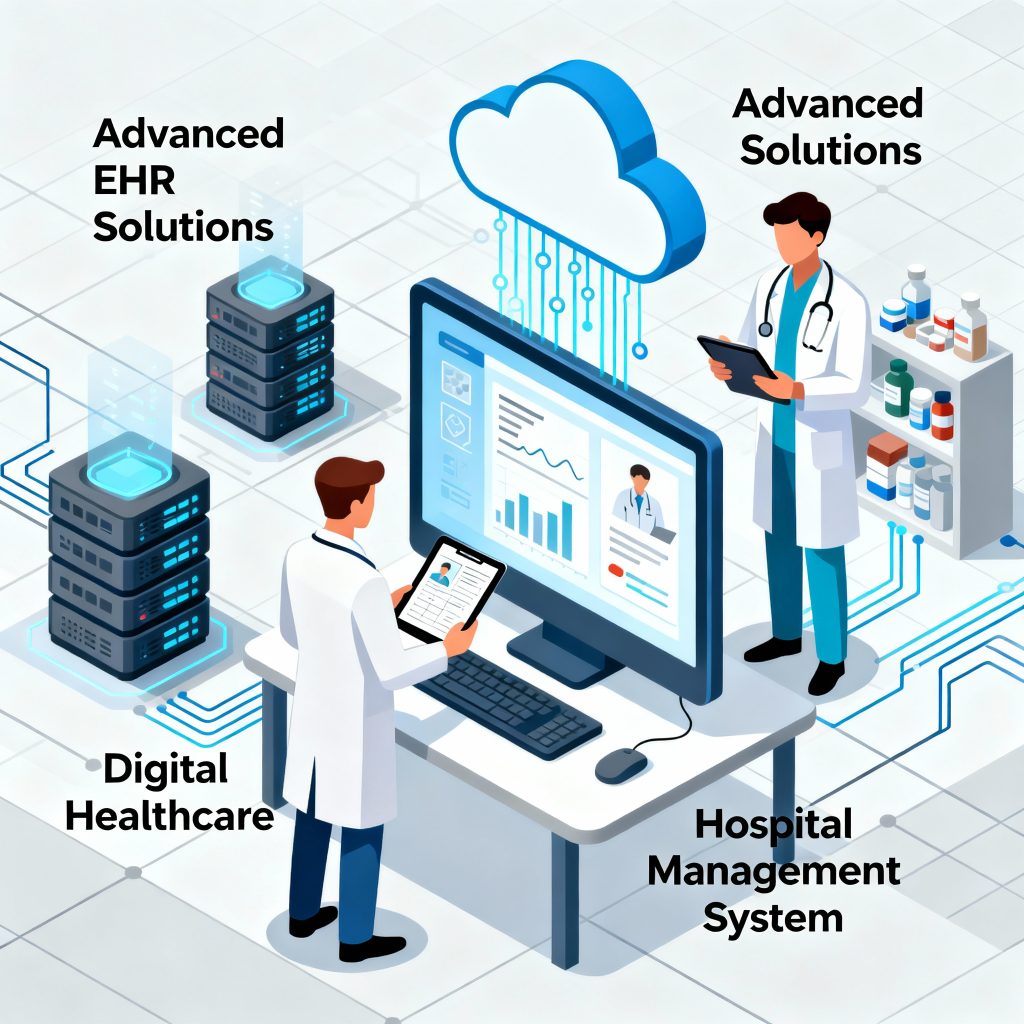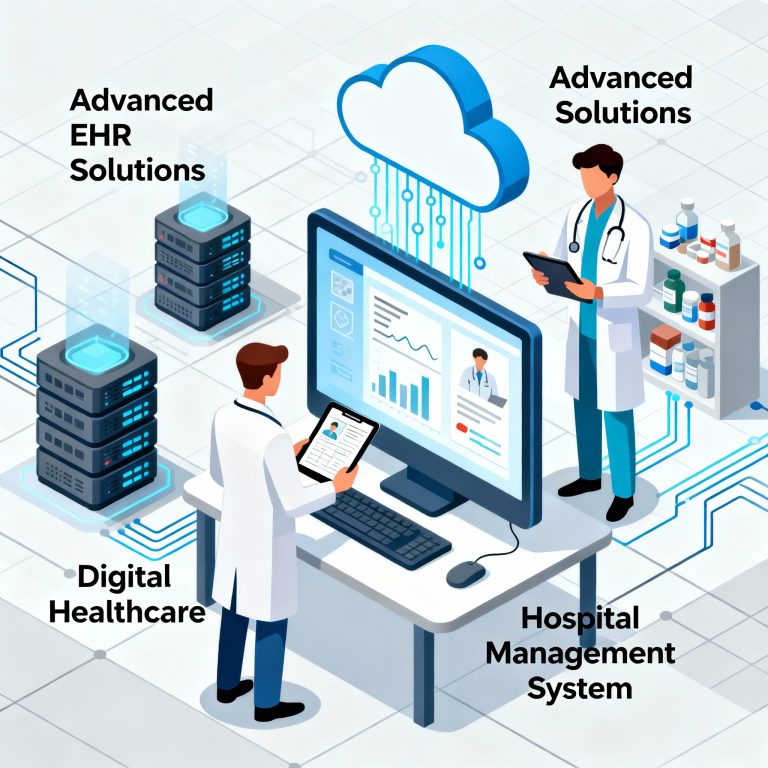In today’s technology-driven world, software development companies are playing a pivotal role in transforming the healthcare industry. With the introduction of electronic health records software, hospitals, pharmacies, and clinics are experiencing a new wave of efficiency, accuracy, and innovation. Moreover, these technological advancements are not just about digitization—they are about revolutionizing the way healthcare is delivered, managed, and optimized.
The Digital Transformation of Healthcare
The healthcare sector has always been one of the most critical yet complex industries. However, with the rapid rise of healthcare software development companies, this complexity is being streamlined through digital innovation. From large hospitals to small clinics, technology has become the backbone of medical operations. Furthermore, electronic health records software has become an essential part of this transformation, ensuring that every piece of patient information is securely stored, easily accessible, and efficiently managed.
Previously, managing paper-based records was time-consuming and prone to errors. But now, with EHR systems, patient data can be accessed in real-time, leading to faster diagnosis and improved treatment outcomes. Additionally, this shift has significantly reduced administrative workloads, allowing healthcare professionals to focus more on patient care rather than paperwork.
Role of Software Development Companies in Healthcare Innovation
A healthcare software development company specializes in building customized solutions tailored to the unique needs of the healthcare sector. They understand that every hospital, pharmacy, and clinic operates differently, and therefore, they design software that enhances efficiency while maintaining compliance with healthcare standards.
For instance, hospital management software helps administrators streamline operations such as patient registration, appointment scheduling, billing, and inventory management. Furthermore, it ensures that all departments—whether it’s the emergency unit or the pharmacy—work in complete coordination.
Similarly, pharmacy management software allows pharmacists to track prescriptions, manage stock, monitor expiry dates, and maintain accurate billing. As a result, it eliminates manual errors and improves customer satisfaction. Meanwhile, clinic management software assists small clinics in managing patient records, appointments, and communication seamlessly.
Importance of Electronic Health Records (EHR)
The introduction of electronic health records software has completely changed how healthcare providers handle patient information. EHRs store everything—from medical history to lab reports and prescriptions—under one unified platform. Moreover, these records can be securely shared across departments or even between different healthcare facilities, ensuring continuity of care.
Additionally, EHR systems support data analytics, which helps doctors and administrators make informed decisions. For example, they can analyze trends in patient health, track chronic conditions, and predict potential outbreaks. Therefore, EHR systems not only improve efficiency but also contribute to better healthcare outcomes.
In India, EHR software in India has seen massive adoption, especially after the government’s focus on digitizing healthcare infrastructure. Consequently, healthcare organizations are now moving toward fully integrated systems that connect hospitals, clinics, and pharmacies through a single digital network.

How Software Solutions Are Redefining Hospitals, Pharmacies, and Clinics
1. Hospitals
Modern hospital management software offers everything a healthcare facility needs for smooth operation. It manages administrative, financial, and clinical tasks in a single interface. Moreover, it enhances transparency by providing real-time data access to doctors, staff, and patients.
2. Pharmacies
The role of pharmacy management software has become crucial in maintaining accurate drug records, tracking sales, and ensuring regulatory compliance. In addition, it helps pharmacists automate stock control and handle e-prescriptions efficiently.
3. Clinics
For smaller medical setups, clinic management software is a game-changer. It simplifies scheduling, reduces waiting times, and maintains accurate patient histories. Furthermore, it improves communication between doctors and patients through integrated messaging or appointment reminders.
Overall, these software solutions not only save time but also enhance the quality of care delivered.
Key Benefits of Healthcare Software Solutions
The collaboration between healthcare institutions and healthcare software development companies brings several benefits, such as:
- Improved Efficiency: Automation reduces manual work, enabling staff to focus more on patient care.
- Enhanced Data Security: Electronic health records software ensures that sensitive medical data is protected from unauthorized access.
- Better Decision-Making: With real-time access to data, doctors can make accurate clinical decisions faster.
- Cost-Effectiveness: Digital systems reduce paperwork and administrative costs.
- Regulatory Compliance: Software solutions help healthcare facilities comply with medical standards and government regulations.
Furthermore, patients benefit immensely from these solutions. They can easily book appointments, access test results online, and communicate with doctors remotely. Thus, technology bridges the gap between patients and healthcare providers.
The Growing Role of EHR Software in India
In recent years, EHR software in India has become a cornerstone of the country’s healthcare modernization. As hospitals and clinics continue to adopt digital systems, patient care has become more integrated and transparent. Additionally, with the rise of telemedicine and digital consultations, the need for robust and interoperable EHR platforms has grown exponentially.
Moreover, government initiatives like Ayushman Bharat Digital Mission (ABDM) have accelerated the shift toward digital health records. This nationwide initiative aims to create a unified health ID for every citizen, making healthcare more accessible and efficient. As a result, the demand for electronic medical records software is expected to rise significantly in the coming years.
How Software Development Companies Are Powering the Change
A healthcare software development company doesn’t just build software—it builds smarter healthcare ecosystems. Through the use of cutting-edge technologies like Artificial Intelligence (AI), Machine Learning (ML), and the Internet of Things (IoT), these companies are making healthcare more predictive and personalized.
For example, AI-powered electronic health records software can analyze a patient’s data to predict possible health risks. Meanwhile, IoT integration allows wearable devices to track vital signs and send data directly to doctors. Consequently, this enables proactive healthcare management rather than reactive treatment.
Furthermore, cloud-based hospital management software ensures scalability and remote access, making it easier for healthcare providers to manage multi-location facilities.
Conclusion: Software Development Companies
To sum up, software development companies are redefining the healthcare industry by integrating technology into every aspect of care delivery. From hospital management software to pharmacy management software and clinic management software, these digital tools are driving efficiency, accuracy, and innovation. Moreover, with the widespread adoption of electronic health records software, healthcare is becoming more connected, patient-centric, and data-driven.
As the demand for advanced digital healthcare continues to grow, the partnership between medical professionals and healthcare software development companies will remain the key to shaping the future of modern medicine. Ultimately, technology is not just improving how healthcare works—it’s transforming lives for the better.

